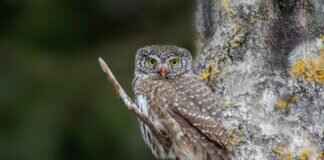A pioneering microscope at Harvard Medical School has the potential to revolutionize cancer diagnostics and longevity research. However, the brilliant mind behind the computer scripts essential for interpreting its images, Russian-born Kseniia Pertova, has been detained by ICE for the past two months. This unfortunate turn of events is now jeopardizing significant scientific advancements.
Pertova, a 30-year-old scientist, was an esteemed member of Harvard’s Kirschner Lab until her arrest at a Boston airport in mid-February. Currently, she is being held at the Richwood Correctional Center in Louisiana by ICE, facing the looming threat of deportation back to Russia, where she fears persecution due to her anti-war activities in Ukraine.
The ramifications of Pertova’s detention extend beyond her personal plight. Academics and experts fear that the detention of scholars like Pertova is undermining the ability of U.S. universities to attract and retain top-tier talent. In fields as specialized as hers, the loss of skilled professionals could have grave repercussions for the global landscape of medical and scientific innovation.
Speaking from the confines of the Louisiana facility, Pertova described her detention as a relentless ordeal. “We are in this machine, and it doesn’t care if you have a visa, a green card, or any particular story…it just keeps going,” she remarked to NBC News. Her first immigration court hearing is fast approaching, scheduled for Tuesday morning, where she and her lawyer, Gregory Romanovsky, hope to glean more insights into her asylum case.
Dr. Leon Peshkin, Pertova’s mentor and manager at Harvard, was caught off guard by her sudden detention. He recounts the harrowing experience of receiving a call from Customs and Border Protection, informing him that Pertova had been denied entry without divulging her whereabouts, leaving him in a state of frantic uncertainty.
Romanovsky, Pertova’s legal representative, criticized CBP’s harsh stance, emphasizing that the cancellation of her visa was excessive punishment for a first-time offense. He decried such actions as part of a broader campaign to create a hostile environment for immigrants.
Pertova’s detention is not an isolated incident but part of a disturbing trend that is unsettling international researchers. The restrictive immigration policies under the Trump administration have exacerbated fears among scientists, potentially deterring talented individuals from pursuing opportunities in the United States.
Pertova’s exceptional skills in computational science and her unwavering dedication to her work set her apart in the competitive scientific community. Her absence has left a void in the Kirschner Lab, where colleagues like Dr. William Trim acknowledge her irreplaceable contributions to their research project involving a unique microscope.
Trim, who visited Pertova at the correctional facility in Louisiana, highlighted her commitment by sending her biology books so she could continue studying while in detention. He and others in the scientific community laud Pertova for her passion and expertise, recognizing her as a vital asset to their collaborative efforts.
Despite her remarkable talent, Pertova remains humble, viewing her work at the Kirschner Lab as nothing short of miraculous. Her dedication to scientific discovery is matched only by her advocacy for democracy and freedom of expression, particularly in light of the political repression she has witnessed in Russia.
As Pertova’s colleagues anxiously await the outcome of her immigration proceedings, the uncertainty surrounding her future underscores the chilling impact of immigration policies on the scientific community. The potential loss of a brilliant mind like Pertova’s serves as a stark reminder of the broader consequences of restrictive immigration measures on innovation and progress.














